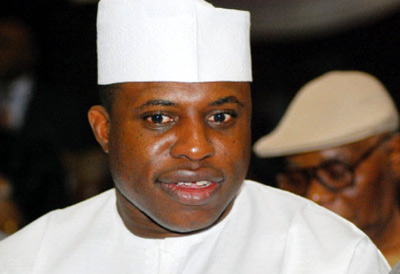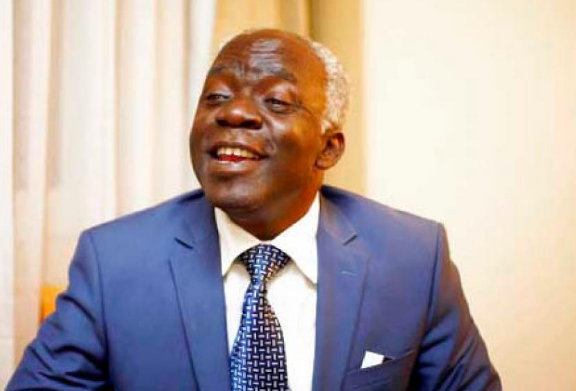In 1985, or was it 1986, a top official of the Babangida administration said something that, up till today, I am still struggling to understand. The naval officer and member of the Armed Forces Ruling Council (AFRC) said: “We are over-pampering the youth when we call them leaders of tomorrow.” I now can’t remember the occasion or the context, but I was already a teenager at the time and was used to the popular expression that “the youth are the leaders of tomorrow”. It was a simple, indisputable statement and a natural fact, I always thought. I, therefore, couldn’t understand his proclamation. Maybe I was too young to appreciate it.
I am much older now and if you ask me to interpret that statement, I would still struggle. Maybe he meant it as a deliberate check on youthful exuberance. Maybe he meant the youth should be reminded of their responsibilities since more emphasis was being constantly paid to their rights. Maybe he meant there is more to leadership than the youth were being told, and being called “leaders of tomorrow” had the power to intoxicate, rather than motivate, them. Whatever he meant, though, the face value of the statement was awful. Imagine if there was social media then: the man would have been slaughtered electronically.
Today’s discussion is inspired by two things: the campaign for the mainstreaming of Nigerian youth in governance — re-inspired by the election of 39-year-old Emmanuel Macron as the president of France — and a recent blog post by Rt. Hon. Dimeji Bankole, former speaker of the house of representatives who attained that position at the age of 37 in 2007. There seems to be a very disturbing conclusion that the Nigerian youth are hopeless and do not deserve a chance in the management of our affairs in the country. Any mention of the Nigerian youth today is dismissed with such commitment that you just have to worry about our tomorrow.
Officially, Nigeria defines youth as anyone between the ages of 18 and 35. A professor once said, jokingly, that he stopped calling himself a youth after his national service. Since we define youth as 18-35, our laws, as they stand, are not terribly restrictive on the qualification ages for political offices. You have to be at least 40 to be a president, 35 to be a governor, 35 to be a senator and 30 to be a rep. To be a minister, section 147(5) of the constitution says no person shall be so appointed “unless he is qualified for election as a member of the House of Representatives”. That means a minimum age of 30. Apart from the president, everything is still within the 18-35 band. Not too bad.
Advertisement
But there are several observations, and questions, I want to table today. The first is that even though a Macron cannot emerge in Nigeria (because he is 39), the law allows us to appoint ministers who are as young as 30. Without amending the constitution, therefore, we can still have ministers who are young. How come we don’t even experiment with making a young person minister of youth development? That, I think, is the least we can do. Generally in Nigeria, we blame the laws for our problems. We want them repealed or amended all the time, but in truth we have not even made the best use of what we have on ground. The apple on the distant tree always looks juicier.
My second observation is that there is a general assumption that the youth are not good enough to be elected or appointed into public office. Commentators and analysts give several examples of young people who have occupied top political positions “with nothing to show for it”. I have two problems with this. One, there is an assumption that the older people have fared better. If so, Nigeria should be a much better place by now since older people have been calling the shots for years. I don’t think this is the case. Two, there seems to be an applied conclusion that to be young is to be incompetent. I do not link incompetence to age, certainly not in Nigeria.
Mr. Donald Duke was 37 when he was elected governor of Cross River state in 1999, and I do not think you would accuse him of incompetence because of that. Comrade Lam Adesina was elected governor of Oyo state the same year at the age of 60 and he did not exactly set the world on fire. I agree that there is a certain level of experience and maturity you bring to a job on the account of your age, but it is not a given. As we praise the elders for experience and maturity, we must not lose sight of the fact that innovation and energy are quite critical in today’s world. We clearly need a mix of these qualities and attributes in the development drive.
Advertisement
In an article (“Reforming Nigeria from within”) by Bankole, which was published on the website of the African Research Institute (ARI), he offered some useful insight into his time as the youngest speaker of the house of representatives. He said then-President Umaru Musa Yar’Adua told the national assembly that only 40% of the 2007 budget’s capital expenditure had been implemented, a typical pattern since 1999. Bankole wrote: “The question that I wanted answered was: what happened to the remaining 60%, especially when we did not have a financing shortfall?” That, he said, was the basis of the return of “unspent funds” to the national treasury championed by him.
“I refused to sign the 2008 budget for four months until unspent funds from the previous year were accounted for and returned. Eventually, over N450 billion came back, which in previous years would have been lost,” he wrote. “In 2009, when the President announced how the budget had performed, he also indicated the return of N300 billion in unspent funds. This was a marked shift in how things were done. In total, during my four years as speaker, N1.3 trillion in unspent funds were returned.” Now, when we talk about the youth not having impact in government, we do not remember this significant development. There is a general feeling of gloom when we talk about the youth.
We may say Bankole’s case is different: he came from a privileged background with an influential politician as a father and he studied at Reading, Oxford and Harvard. But that also presumes we do not have well-educated youth in Nigeria again. I have met young Nigerians all over the world who are doing very well in their fields — and in some of the world’s first-class institutions. Many of them studied both in Nigeria (in spite of our failing education system) and abroad. We, therefore, are not reasonably justified to dismiss every young person as unqualified and incompetent. And even if they are, it is the duty of leadership to take a look at the problem and address it rather than celebrate it.
My third, and final, observation is that people who spend so much time on Twitter, Facebook and comment sections on websites — where the youth certainly predominate — have since concluded that the future of Nigeria is doomed going by the messages of hate and the gush of bile on the social media. I have heard people ask: is this the kind of youth that you call leaders of tomorrow? There is also the worrisome bit about the quality of contributions to debate. There is usually shallowness and a poor understanding of the basic issues. There is the sad aspect of the lack of understanding of history. All these are legitimate worries. I, myself, am very disturbed by this.
Advertisement
But, please, don’t blame the youth. You reap what you sow. How much investment has Nigeria made in them? We all know what education system has become. Only the privileged can send their children to quality schools these days, and how many are so privileged in a country of 180 million people? We have ended up with an overwhelming population of youth wreaking havoc on the internet and on the streets. What did we do 20 years ago, 10 years ago to prepare them for today? How were their minds shaped? Can they give what they don’t have? How are we preparing them today for their tomorrow? How are their minds being shaped? Is there any change?
Progressive societies deliberately build the future of their youth. They deliberately give them good education. They deliberately mentor them through various programmes and schemes. They deliberately give them opportunities to express themselves and put their skills to use. They deliberately build their experience and self-confidence. They don’t tell them “we are over-pampering you by calling you leaders of tomorrow”. They deliberately prepare them for leadership. So a 39-year-old Macron can be president of France, but in Nigeria it will be front-page news today if a 30-something year old is appointed a presidential adviser. Rethink.
AND FOUR OTHER THINGS…
DECREE 2 IS BACK!
Alhaji Lai Mohammed, the information minister, says Nigerian State Security (Detention of Persons) Decree No. 2 of 1984 — which allowed for indefinite, incommunicado detention of Nigerian citizens — is still in operation, even though it was repealed in 1998 by Gen. Abdulsalami Abubakar. The decree was promulgated by, erm, Buhari 33 years ago to detain people indefinitely for “security reasons”. It ousted court jurisdiction. To be sure, Lai did not use the words “Decree No. 2”. He simply said, on Friday, that the government will not obey court orders to release Col. Sambo Dasuki (rtd) and Sheikh Ibrahim El Zakzaky “for security reasons”. Unsettling.
Advertisement
ROUGH ROAD
One of the most enduring shames of Nigeria is the road that leads to the Murtala Mohammed International Airport, Lagos — one of the busiest airports in Africa. I always cover my face in shame when passing through the road. Is this the right way to welcome visitors to our country? Is that the best we can do? For the past seven years, we’ve been discussing how the Lagos state government can rebuild the road since the federal government was not in the mood. I was so delighted to hear on Wednesday that the federal government has finally given the state the go-ahead to do it. What took us so long? Is the approval process similar to rocket science? Unbelievable.
Advertisement
SIGN OF THE TIMES
Acting President Yemi Osinbajo was all set to sign the 2017 budget on Thursday. He had invited leaders of the legislature to the formal ceremony at the Presidential Villa. Suddenly, word got out that he was no longer going to do it. Why? Nobody told us, but the rumour is that since President Buhari is “likely” to return to the country this week, Osinbajo decided to defer to him. I am still wondering what this is all about. Section 145(1) of the 1999 constitution is very clear that Osinbajo can sign the budget and there is no Jupiter that can reverse it. Did Osinbajo succumb to blackmail? Or was he trying to play the “loyalty” game? Unfortunate.
Advertisement
DANGERS AHEAD
As the Igbo marked 50th anniversary of Biafra declaration on Tuesday with a sit-at-home in the south-east, my attention was focused more on the rising tension across the land. In my experience, some people are wont to dismissing the threat to peace and unity in Nigeria, and there is often this claim that Nigeria is “too big” to fail. But the vibes I get are that Nigeria remains sharply divided politically — as it was before Biafra. If anything goes wrong again, especially with the drama and intrigues currently playing out inside Aso Rock and the military, we may have more than one Biafra to contend with. We must work consciously to calm this tension. Unnecessary.
Advertisement
1 comments








Literature. Don’t blame the youth, we can not blame the elders either. Are the youths really ready for leadership? Many youths have at one time or the other tested their feet in the politics of the nation, but their stumbling block has always been youthful exuberance and neck deep wastefulness coloured with wanton corruption. The ordeal of the photo boy of your article is still fresh in our memory. Though born of the velvet, purple blood or whatever, Banky still soiled his hand. What about Salisu Buhari? Idi Hong and many other younger generation that have been tested with responsibility of leadership at the onset of their 40s, the stories were never palatable. For record, Kola, which of course, I know you know, Gowon was less than 30 when assumed the leadership of this country, Murtala would have been 80 by 2018 if he were to be around (RIP), having assumed leadership also in his late 30s. Obasanjo should be 37 or thereabout when he became the Head of state. Come to think of it, was Nigeria fared better under the rulership of the trio of this under forty? You will agree with me no!!. Ikemba would have successfully exodused the Igbo out of Nigeria if not for youthful exuberance of under forty that betrayed his at the time. This aspect is just the political side, xray the side of our traditional stools, what we have today is array of youthful traditional rulers, ruling their empires like the far youthful Napoleon in his days; some opinions have described our modern youthful kings as internet Obas, obis, emirs etc. They jostle for space at every function, standing before cameras to occupy space on the front page of national journal, which their forebears never did. In my opinion, youths are just part of our tomorrow, not necessarily leaders of tomorrow. If some of our past leaders, some of whom l mentioned above are given the second chance, they would have loved to rule now that they are matured in physical and mental. Reasoning.